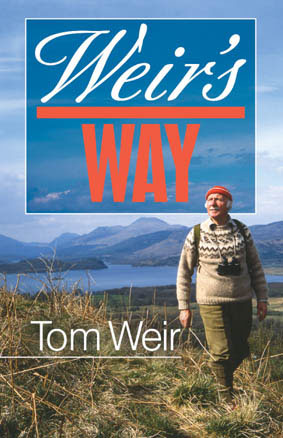
 | Weir's Way Tom Weir |
| sample extract... | |
My friend lain hates motor cars. He likes their convenience but doesn't begin to enjoy himself until his rucksack is packed with tent and food and he is on his way into roadless hills. Now we were on our way along the wild eastern shore of Loch Maree where he was quoting me an Arab proverb that a man's soul can only go at the speed of a trotting camel. I could hardly hear him for the gale-force wind and the noise of the waves. The gusts were helping us along though, buffeting our backs, a big advantage when our packs weighed about 30lb apiece, containing tent and all the stuff you need for March camping. We were soon warmed up and enjoying the white horses on the water and the winding path lifting out of Glen Bianasdail past rickles of stones and green patches among the rocks which told of past crofting. The target we had picked out on the map as a possible campsite was a narrow inlet of the loch. It was just a hunch Iain had that it could be a good spot. We were forced to climb high by the broken nature of the ground and suddenly it was below us, seen through a screen of oak trees stretching right down, giving perfect shelter and a turfy platform close to a burn. Tent down and the stove purring, we got the soup and the chops on, as happy with ourselves as a couple of Scouts. We were away by 9am in the sunshine of a perfect morning, threading silver birches and startling a herd of wild goats. Now and again we had to stop to pay homage to the new sights opening up across the loch, the skyline of the Torridon peaks above the Caledonian pines of Beinn Eighe; a sudden blizzard of white wings as over a hundred snowbuntings swirled in the air ahead of us musically calling; then a picturesque group of Highland ponies gazing down on us from knolls of red bracken. Next we came to the place marked on the map 'Furnace', site of the first known ironworks in the Highlands. Dating back to 1600, it used the forest oaks to make charcoal and smelt the ore shipped from Cumberland. It was the beginning of an industry that swallowed up the woods of Loch Maree until '...the trees of it were spent.' The only trees that remained were those too difficult to extract. The oaks of Loch Maree are the most westerly in Scotland. |
|